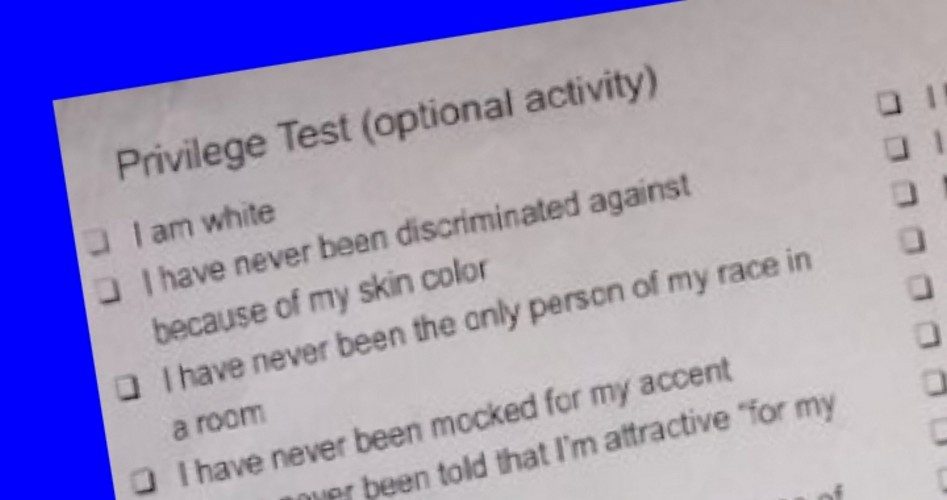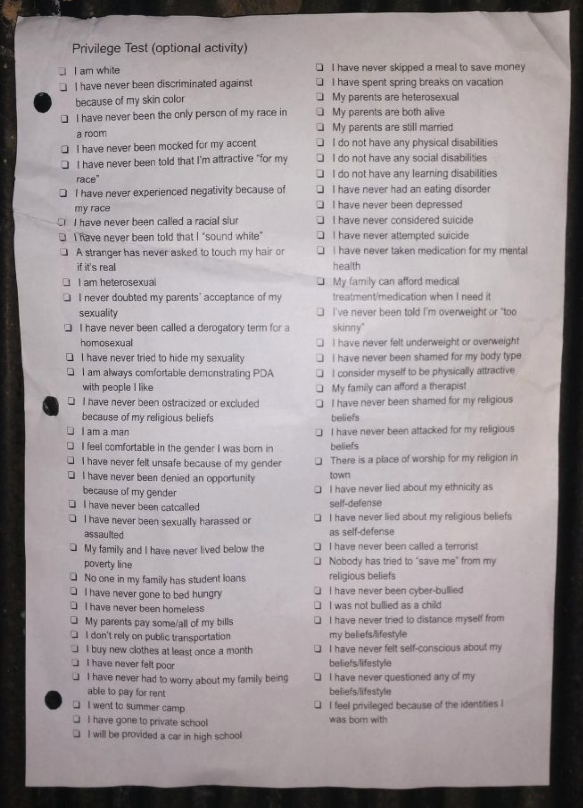
If you believe the three r’s long ago became racism, relativism, and revisionism, you won’t be surprised by a story out of Wisconsin: a middle school has been caught giving students an intrusive, 55-question survey that they believed would spark a conversation on “privilege.”
Students at West Bend’s Badger Middle School were supposed to check boxes next to statements that applied to them, such as “I feel comfortable in the gender I was born in,” “I never doubted my parents’ acceptance of my sexuality,” “I have never been called a derogatory term for a homosexual,” “I have never been told that I’m attractive ‘for my race,’” and “I have never been called a terrorist.” The “privilege test,” as it has been called, was given to 150 eighth-graders after they read the book To Kill a Mockingbird.
Yet while the exercise could be titled “To Kill Education,” the school has discontinued the survey but didn’t exactly issue a mea culpa. As Fox 6 reports, “This wasn’t the first year for the test. District officials say they would have done things differently, but they stand behind the idea of the exercise.”
American Thinker’s Thomas Lifson translates this, writing, “They don’t admit to doing anything wrong, but promise they won’t do it again. That means that they have to be less blatant in their indoctrination efforts.”
Badger Middle School Principal Dave Uelman played the politician, saying, “Some of the language in the questionnaire I can see why, as a parent of a 13, 14-year-old eighth grader, some people may feel as though those are topics that should be discussed in the home and not the classroom,” Fox 6 related. Below is an image of the survey.
(This article continues after the image.)

But the lack of contrition is unsurprising. As Lifson explained, “The educrats believe it is their duty to enlighten the vulnerable young minds whose care has been entrusted to them by the state” — and who otherwise would be subject to the guidance of only their yahoo parents.
Lifson continues, “Adolescence is a time of identity formation for adulthood, and is full of insecurity and pain, hard enough without being pushed into thinking of yourself as the guilty victimizer of people you’ve never met.” “Guilt” is the operative word; this school exercise is merely a reflection of “white privilege” theory, which in recent years has swept academia. Just consider a sampling of related stories from just the past month:
• A “Problem of Whiteness” course was just reintroduced at the University of Wisconsin-Madison (which illustrates how these efforts don’t die but just lie dormant until the threat to insanity passes).
• A University of Michigan training session used a “Privileged Identity Exploration Model” to help “white employees deal with their ‘whiteness’ so they could become better equipped to fight for social justice causes,” reported the College Fix.
• A late November Cal State San Marcos “Whiteness Forum” highlighted 14 ways “whiteness” oppresses society.
• It was reported December 1 that Evergreen State College’s student newspaper has a no-whites-allowed opinion section.
As with Badger Middle School, rest assured that the aforementioned institutions will also “stand behind” their social engineering. This gets at the real issue: The underlying problem in West Bend isn’t the bizarre “privilege test,” but the mentality that spawned it. The test was just a manifestation; until the destructive mentality in question is purged from society, there will be other manifestations — and there already are, at Badger and elsewhere. This is what parents have to be mindful of: What social engineering is occurring that you don’t see, that perhaps is so subtle only a trained eye could identify it?
One reason this problem is so intractable is that, as the saying informs, “A man capable of only deceiving others is not nearly as dangerous as man capable of deceiving himself.” Most educators pushing this nonsense aren’t liars as much as people who believe lies. Just consider a comment West Bend assistant superintendent, Laura Jackson, made when justifying the privilege test: “If we want our students to be successful when they go out into their careers in the future, they have to understand that not everyone is like them.”
This is first a false supposition. Would your main criterion for choosing a doctor to perform your child’s brain surgery be that he’s multicultural-minded, that he understands not everyone is like him? Or would it be that he’s the absolute best neurologist you can find? Do you choose an auto mechanic based on his understanding of human differences? Or would an ethnocentric fellow who knows cars inside and out be a better bet?
The real problem here is a lack of belief in Truth. We should know how to treat others, but this isn’t learned via new social-engineering schemes. The key is inculcating children with virtue (good moral habits): charity, chastity, kindness, patience, humility, prudence, etc. Teaching the “Thou shalt nots” (e.g., kill, steal, covet, commit adultery) is imperative, too.
In contrast, leftist faux-virtue efforts — tolerance training, sensitivity classes, privilege awareness, etc. — instill no proper discernment. They teach love of the sin at least as much as that of the sinner. It’s hypocritical, too. The idea of inclusiveness is a lie: Do its advocates teach acceptance of bestiality and polygamy along with that of homosexuality (although, give it time)? Do they insist on acceptance of Christians who don’t cotton to their sexual agenda? The point is that everyone draws lines — including those claiming to only draw a line at drawing lines.
Yet the misconceptions run wide and deep. One parent objecting to the privilege test, Kim Goldman, is quoted by Fox 6 as saying, “As a parent it’s my responsibility to teach my children the difference between right and wrong,” the implication being that this isn’t the school’s domain.
This is fantasy. There’s no such thing as value-neutral anything, let alone education. For morality is always transmitted either explicitly or implicitly. For example, punishing a child for misbehavior relates the idea that the action is wrong. If you teach about the Nazi era, you could either transmit the idea that the National Socialists were right or wrong, or you could take a neutral stance, in which case you would transmit relativistic values. In a nutshell, the creation of behavior standards is all about right and wrong; the devising of curriculum involves value judgments about what is right and necessary to teach.
This is why parents, and people in general, should take note: If you don’t control the culture, others will.
And then, eventually, the culture will control you — and your kids.

